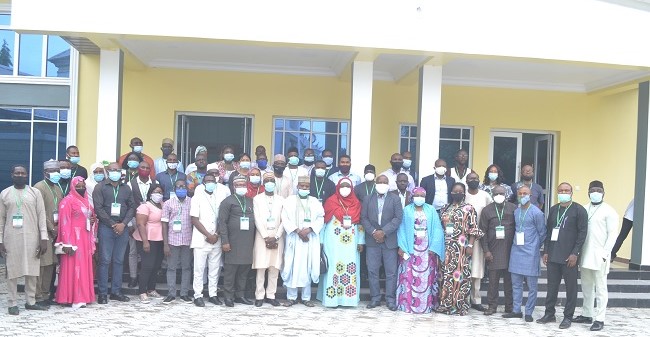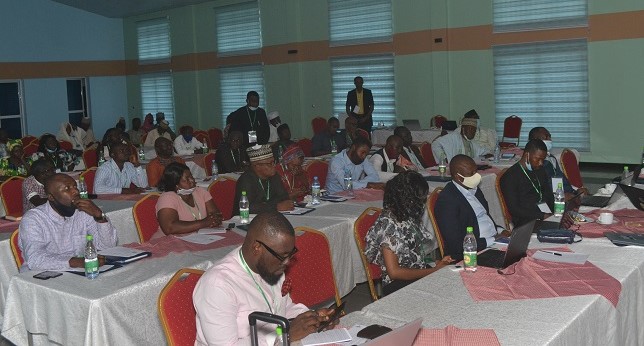In continuation of the Regional Nationally Determined Contribution (NDC) Business Roundtables to sensitise and increase private sector participation, the United Nations Development Programme (UNDP) NDC Support Programme held the third in the series for the North-Central Region in Keffi for two days in September 2020.

After the South-West version held in Lagos in September 2019 and South-South edition held in Port Harcourt, Rivers State, in February 2020, some 72 participants gathered in the Nasarawa State university city from September 29 to 30 for the third of planned six Roundtables.
In 2018, the UNDP through its NDC Support Programme reached out to Nigeria to support the nation’s effort in the implementation of the NDC also called the Paris Agreement, with a view to fully achieve the emission reduction targets sets for Nigeria, building on the five priority sectors of Agriculture, Power/Energy, Transport, Oil & Gas, and Industry.
One of the key activities under the support received is the issue of increasing private sector participation, which is being achieved by the six regional NDC Business Roundtables across the country to communicate the NDC targets and facilitate enhanced organised private sector’s involvement in the process.
In her opening remarks during the North-Central NDC Business Roundtable, Acting Director, Department of Climate Change, Federal Ministry of Environment, Mrs. Halima Bawa-Bwari, said that the workshop is aimed at communicating government’s efforts in the implementation of the NDC with particular emphasis on increasing the role of the private sector in the current revision, design and implementation of the 2015 NDC.
“It further aimed in developing a common understanding of the status of Nigeria’s NDC implementation, strategies in and support received since the ratification of the Paris Agreement. it will be very useful that we take adequate steps to communicate these government steps to the private sector across all regions of the country and also seek the active participation of private sectors in its actualisation,” she added.
According to her, the NDC and its targets are aimed to ensure sufficient climate resilience is built across critical sectors while the country continues to pursue its economic growth at a low carbon pathway.
“In the spirit of ensuring whole-of-society approach, inclusiveness and leaving no-one-behind, the Federal Ministry of Environment will continue to encourage organisations and citizens to fully understand and play their respective roles in responding to climate change by choosing emissions reduction actions within their operations by adopting efficient ways of doing things, lowering their carbon footprints through the use of greener products and services.
“Governments in its part will support informed greenhouse gas management decisions by providing information directly to the public and/or by creating or supporting organisations that help the public and private sector reach emission reduction targets.
“I want to therefore assure you that government is committed to domesticating the elements of this global agreement and the NDCs targets into its national developmental programmes and plans including the Post-Covid recovery plan.”

National Coordinator of the Nigeria UNDP NDC Support Programme, Mr. Huzi Mshelia, disclosed that the predominant business activities in the zone include mining and agriculture, which he described as high energy intensity and high greenhouse gas (GHG) emitting. He noted that the NDC industry targets “should take note of this vast and special interest to accordingly reflect in the revision process”.
While emphasising that critical needs for the private sector is to be very competitiveness, skilful, highly resourceful, sufficiently capacitated and well synergised with government programmes, participants expressed hope the NDC process can provide such baskets of expectations.
The forum also underlined the need for the private sector to create necessary synergise amongst themselves and act as a force through deliberate optimisation of the NDC opportunities.
It was also identified that 95% of the businesses operating in the zone are SMEs based with no well-structured opportunity to partner with public sector. They hope the NDC process can provide such bridge to connect with public sector interventions.
Doing things differently – change management, behavioural change, embracing new technologies and incorporate new skills into design – are some of the needs recognised for the private sector to make the transition.
Other key messages that emerged from the forum are listed to Include:
- Need for clear guidance on the NDC process and how to practically engage and benefit from the process;
- No harmonised policy for investment as most policies are fragmented – for example, energy policy not in tandem with industrial policy;
- Awareness amongst governments entities-ensuring that the emission reductions criteria are entrenched from the beginning of projects;
- Issue of collecting data for establishing baseline is still a concern and affect efficient planning;
- Weak institutions for the implementation of the policies;
- Need to create the necessary interlinkages between the products from the mining industry (dry cell batteries, computers components, ammonium fertilisers) with the NDC process and broader industrial policies;
- Need to strengthen planning across industry and government;
- The need to develop a standardised template for collection of data is imperative;
- That a Climate Change Regulatory Framework is imperative if Nigeria actually wants to attain its NDC targets;
- Awareness creation for the private sector must be prioritised and made continuous;
- Education institutions to be part of the NDC implementation to ensure sustainability and ownership at early ages for young persons;
- Need for mechanisms for evaluation of the policies and the NDC should be established and shared widely;
- Human security dimension and its impact on the NDC implementation should be studied and factored as contingency;
- Insecurity in the zone is a major challenge to food security and by extension to the NDC;
- The NDC should not only focus on emission reduction but also making a business case for agriculture through targeted funding;
- Need to consider the provision of free scholarship for students studying agriculture in the universities and other tertiary institutions;
- Promoting partnership between university research centres with private sector on agricultural development;
- Need for further enlightenment on how the private sector and SMES can benefit from the Green Bonds issuance;
- Need for dedicated capacity development sessions on access to climate finance and the leveraging of carbon assets should be organised; and,
- Several interests expressed to join the Private Sector NDC Working Groups established as platforms for continued engagement with various interest groups during the revision and implementation processes.
The remaining three sessions – for North-East, North-West and South-East – have been scheduled to hold in October 2020.
